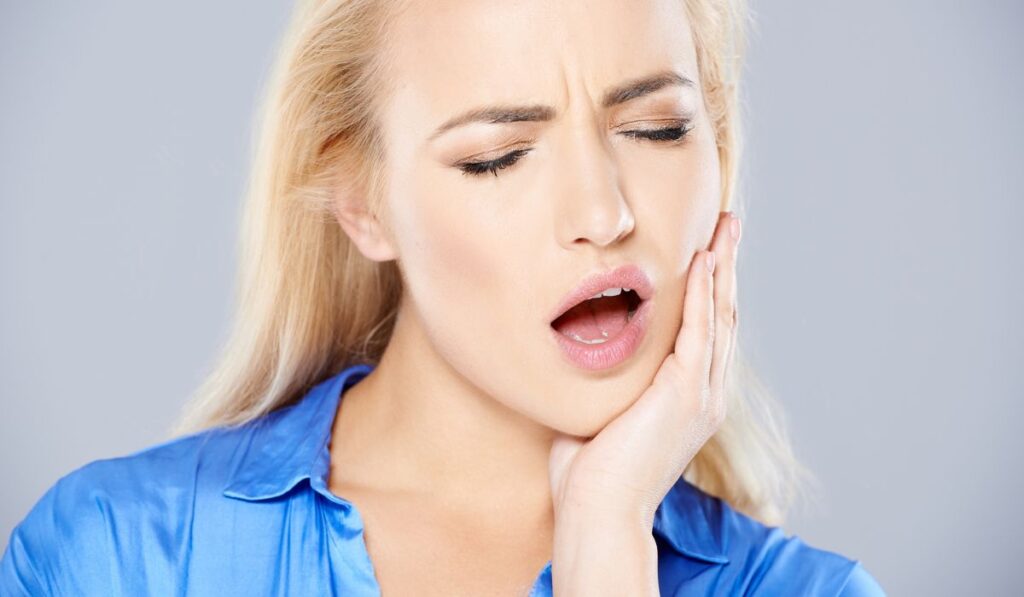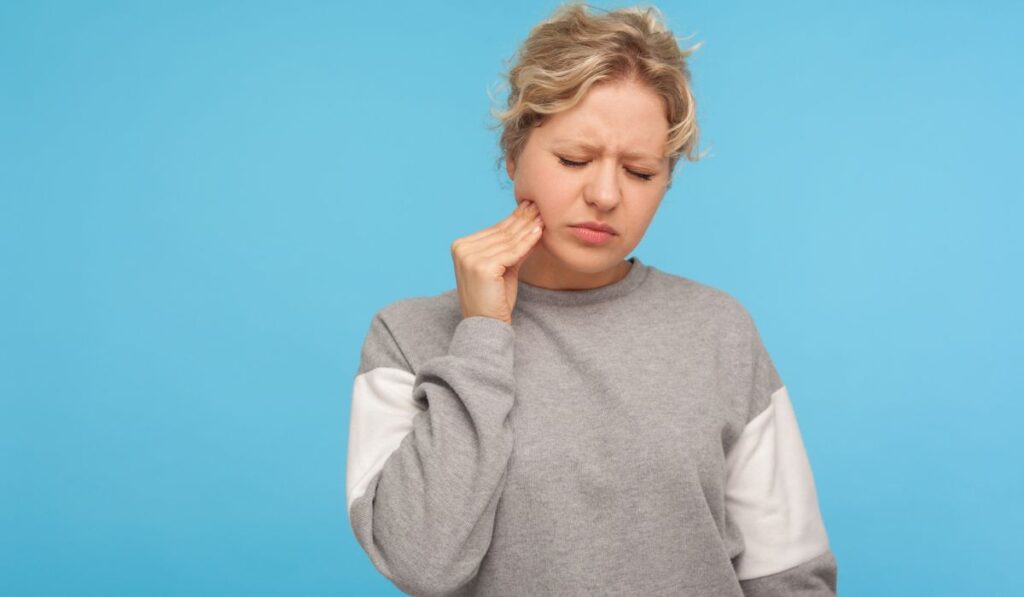It’s impossible to go a day without opening your mouth. But from time to time, you may feel pain in your jaw when you open your mouth wide. So, what causes this pain, and what can you do to remedy it?
If you feel pain in your jaw when you open your mouth, it may be caused by a TMJ disorder. Other common causes of the pain include stress and trauma, muscle spasms, and neuropathic pain. In most cases, home remedies can cure the pain. If the pain is severe, you should visit a doctor.
So, what is a TMJ disorder, and how do you know whether it’s causing your jaw pain? Let’s discuss what factors cause jaw pain and how you can reduce the pain with home remedies.
Why Is Your Jaw Hurting?

If your jaw hurts occasionally, you’re among 15% of Americans who feel mild to severe jaw pain. You may feel jaw pain when you open your mouth to talk or when you sneeze or yawn.
Several factors may cause your jaw to hurt when you open your mouth. These factors include temporomandibular joint (TMJ) disorder, sinusitis, a jaw-clenching habit, and dental problems. You might also feel severe jaw pain if your jaw is dislocated or injured or if you’ve undergone oral surgery.
You may also feel pain when you open your mouth especially wide. The type of pain you feel depends on the underlying condition that’s causing the pain. This pain may become worse when you drink cold liquids, run or grind your teeth.
Let’s discuss these causes of jaw pain in detail:
Jaw Pain When Opening Mouth Wide
If your jaw hurts mildly when you open your mouth wide to talk, eat, or yawn, you probably don’t need to worry about it. Many people feel mild jaw pain when they open their mouth, and there can be various underlying reasons behind the pain.
If you have a TMJ disorder, you’re more likely to feel jaw pain when you open your mouth wide.
The temporomandibular joint (TMJ), commonly known as the jaw joint, connects your jaw to your temporal bone. Since it keeps your jaw in place, you’ll often feel pain when there’s pressure on this joint.
If you have a TMJ disorder, it could be caused by an underlying medical condition. The most common causes are arthritis and gout.
TMJ dysfunction can also be caused by grinding or clenching your teeth excessively. This may result in tooth erosion, which eventually can cause jaw pain.
While a TMJ disorder is usually the main factor that causes jaw pain when you open your mouth wide, it’s not the only one. Other factors that cause jaw pain include muscle spasms, surgery, teeth grinding, arthritis, and some dental conditions.
But before discussing these causes, let’s take a closer look at TMJ disorders and their symptoms.
Symptoms of TMJ Disorders

The TMJ is the joint that connects your upper and lower jaws. In most cases, you don’t need to worry if you have a TMJ disorder since the symptoms are usually mild.
There are three significant symptoms that suggest that you have a TMJ disorder. These include:
- Restricted jaw movement
- A painful sensation on one or both sides of your jaw
- Facial pain
If you feel these symptoms, it’s most likely that you have a TMJ disorder. However, as the TMJ disorder progresses, you may start to experience more severe symptoms such as persistent migraines, pain in the temporal bone, and ear pain.
If you experience these symptoms occasionally or the symptoms are getting worse, you’ll need to visit a medical professional for treatment.
Other Reasons for Jaw Pain
While TMJ disorders and jaw clenching are the most likely cause of your jaw pain, other dental and medical conditions may also result in mild to severe pain when you open your mouth. Some conditions can make the pain so unbearable that eating or talking may become difficult.
Other causes of jaw pain include natural wear and tear of your teeth, stress and trauma, heavy physical exercise, misaligned teeth or jaw, muscle spasms, and neuropathic pain.
Let’s discuss each of these causes in detail:
Stress and Trauma
Though it sounds strange, stress and trauma can also trigger pain in your jaw when you try to open your mouth wide. When you’re under stress, it may put pressure on the nerves in your gums and jaw muscles.
You’re more prone to feel jaw pain whenever you try to open your mouth wide if these muscles are under stress. It’s the same reason why you may feel muscle tiredness when you’re stressed out.
Heavy Physical Exercise
Heavy strength or endurance exercise may also cause you to feel pain behind your jaw when you open your mouth wide.
Pain in your jaw during or after heavy physical exercise can be caused by blood pressure problems or improper body posture.
Remember, your body is designed to tolerate a certain level of pressure. When you push your body beyond its limits through heavy physical exercise, your jaw muscles may react and become compact.
Eventually, when you try to open your mouth wide, you’ll suddenly feel pain in your jaw.
Muscle Spasms
Often, the jaw pain you feel while opening your mouth is triggered by muscle spasms. Muscle spasms happen when muscles contract and become stiff. When you open your jaw wide, the stiff muscles are stretched to their limits, which causes jaw pain.
Muscle spasms are caused by muscular tension, lack of nutrients, overuse of muscles, and disturbed flow of blood. You may also experience muscle spasms when you wake up in the morning or due to cold weather.
Fortunately, they aren’t typically a recurring problem and only happen rarely.
Dental Conditions That Cause Jaw Pain

If you experience mild to severe jaw pain and you have no underlying illness, the most probable cause is a dental problem.
Dental conditions that cause jaw pain include bacterial infections, cavities, and dental injuries. If you’ve undergone surgery, have sensitive teeth, or suffer from gum disease, you may experience more severe jaw pain.
Here are some dental conditions that cause jaw pain:
Natural Wear and Tear of Your Teeth
Natural wear and tear can result in jaw pain over time, especially if you have misaligned teeth. It may also expose your teeth’s enamel and weaken the tooth roots. Since the tooth roots are connected to the jaw, the pain will eventually spread.
Eating hard foods or grinding your teeth may accelerate their natural wear and tear.
Teeth Tightness
Tightness in your teeth is another factor that causes jaw pain when you open your mouth wide. Fortunately, this pain is usually mild and often occurs when you wake up after a long nap.
Tightness of teeth can occur:
- When you clench your jaw for too long
- If your teeth are exposed to cold
- If you wear braces
- When you keep your mouth wide open for too long
Neuropathic Pain
Neuropathic pain may also increase pain in your jaw when you open your mouth wide. Neuropathic pain is a result of damage in your nerves due to cavities and other dental problems.
People with sensitive teeth are more likely to experience jaw pain due to this condition.
Most dental problems are caused by eating unhygienic or sugary food and drinks, an unhealthy diet, or prolonged exposure to cold things. Grinding your teeth regularly can also cause cavities and other dental problems, which can worsen jaw pain.
What Are Some Home Remedies for Jaw Pain?
If you feel mild jaw pain when you open your mouth wide, you don’t need to go for expensive treatments initially. Home remedies can reduce the pain, especially if there’s no serious underlying medical or dental condition that’s causing it.
Home remedies include herbal treatment, decongestant sprays, adopting a soft diet, and acupuncture. A change in lifestyle and therapy may also help.
Let’s discuss these treatments in detail:
Herbal Treatments
Herbal treatments are one of the most effective remedies that can help you deal with jaw pain. Chewing cloves can help you cope with the symptoms of a TMJ disorder.
If you have a dental problem or mild infection, you can take calendula (on Amazon). It works as an anti-fungal, anti-bacterial, and anti-inflammatory herb that can soothe the pain.
Many people also use rose petals to get rid of gum problems. However, if the problem is severe, always visit a dentist for professional advice.
Decongestant Sprays
Decongestant sprays (on Amazon) are ideal for getting rid of jaw pain caused by sinusitis. You can buy them at any pharmacy or make them at home by mixing sterile water, salt, and soda powder.
If you choose to make your own, be careful not to add too much sterile water as an incorrect mixture can increase your jaw pain instead of lessening it.
Adopting a Soft Diet
If you have jaw pain, the last thing you want to do is chew on hard candy or other tough foods like carrots. If the condition is temporary, eat soft foods and drink more juices to avoid putting pressure on your jaw. When your jaw heals, you can go back to your regular diet.
Changing Your Lifestyle
Slight changes in your lifestyle can give you lasting relief from jaw pain, especially if the pain is caused by stress or anxiety. Get enough sleep, eat healthy foods, and exercise regularly to reduce the risk of falling into depression.
However, avoid excessive exercise, as this can cause muscle pain, headaches, and jaw pain.
Acupuncture
Acupuncture is a common method for healing jaw pain. It’s a form of therapy where a professional inserts small needles inside your skin. These needles can help activate dormant nerves and reduce the pressure on certain muscles.
While these home remedies are effective, they’re usually only suitable for mild jaw pain. If you experience severe or persistent jaw pain, you may have to visit a doctor.
When Should You See a Doctor?
Visiting a doctor is a final resort to deal with severe jaw pain. You should immediately visit your doctor if:
- You feel persistent jaw pain that lasts for several days
- You can hardly open your mouth, and eating becomes difficult
- You can’t breathe properly due to jaw pain
- You’ve tried some home remedies, and the pain doesn’t go away
Your doctor will identify the underlying medical condition and give you long-term treatment advice.


